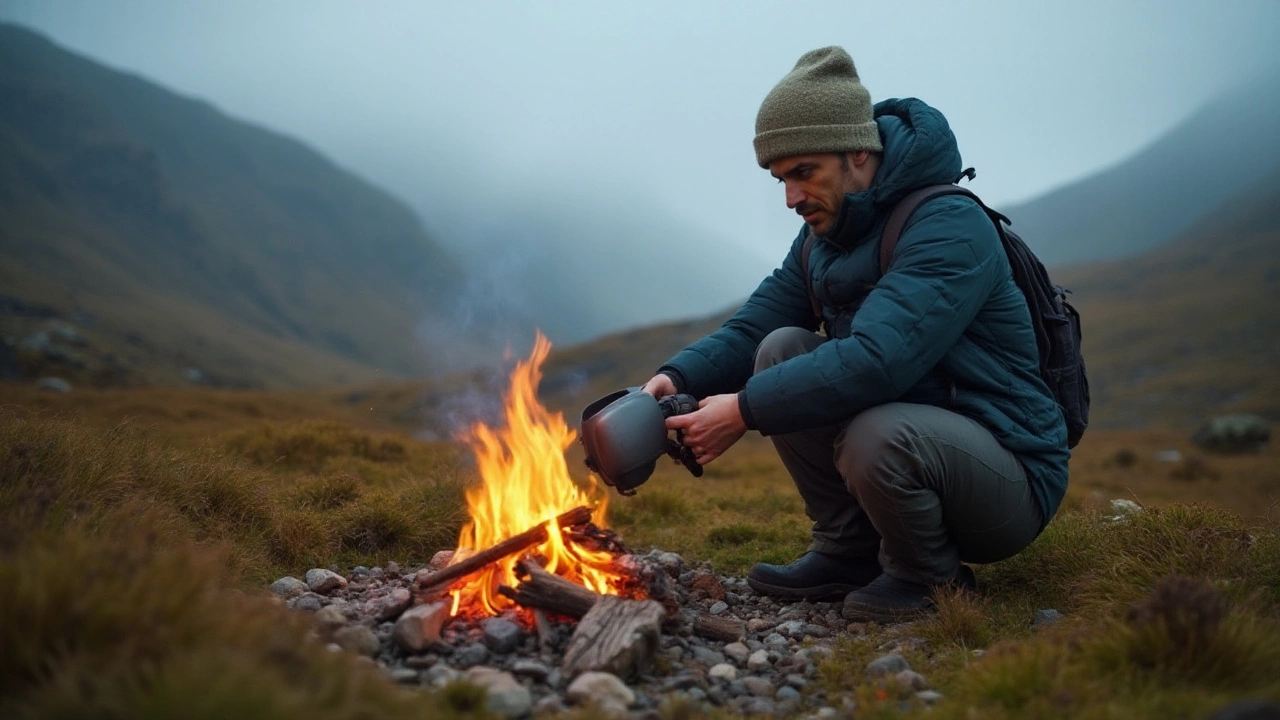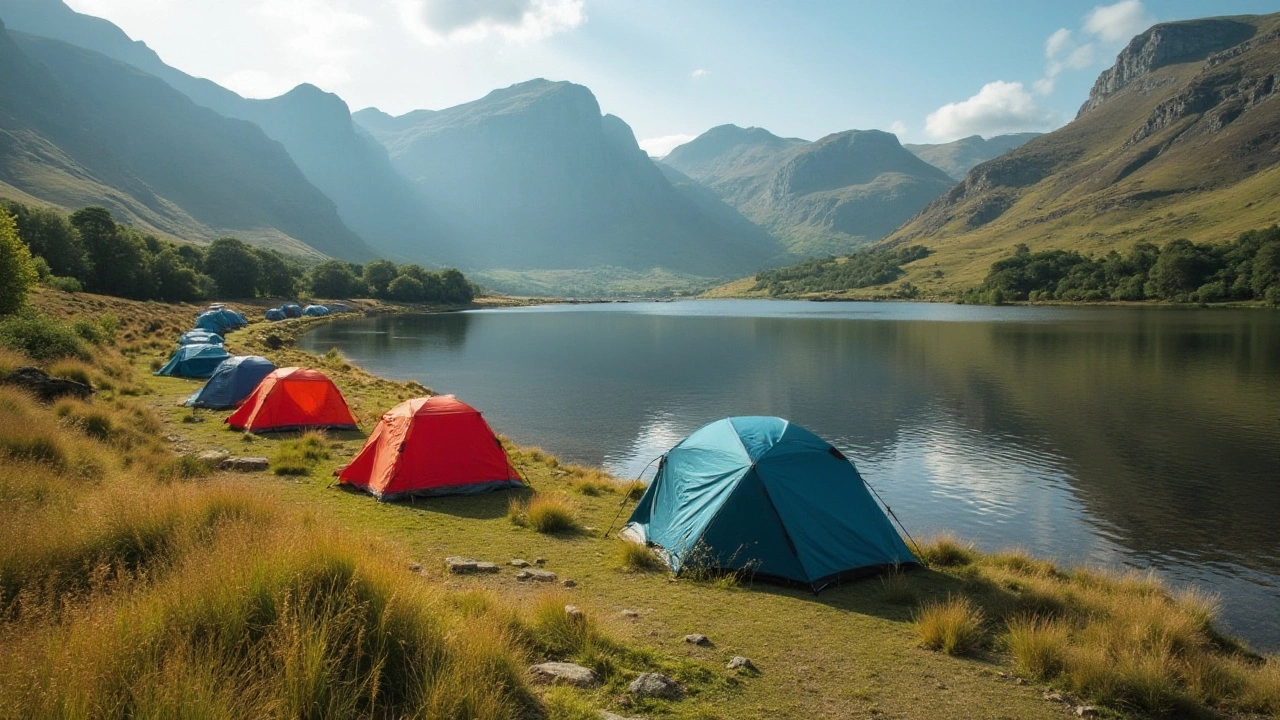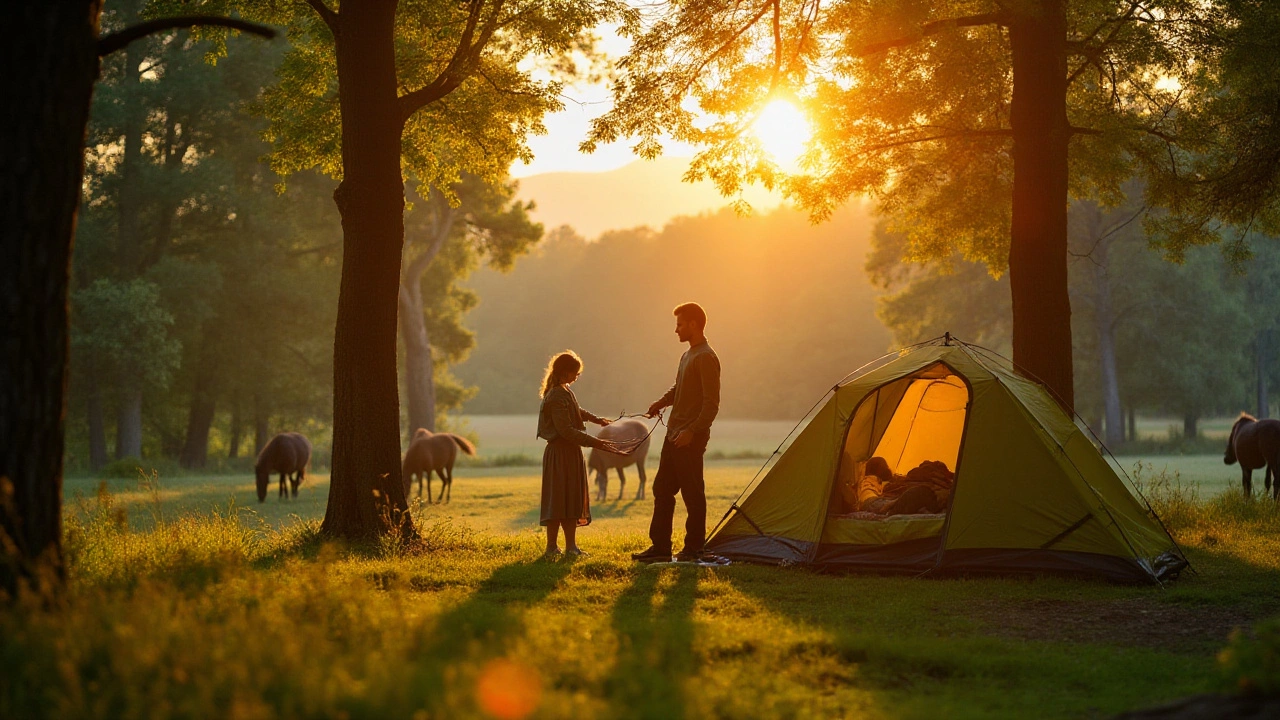Camping in the UK's enchanting woods offers an escape into a world where nature envelops you in tranquility. The promise of an unplugged adventure is appealing, yet understanding the rules around wild camping is vital before pitching a tent. While the allure of sleeping under the stars tempts many, it's crucial to be aware of where such adventures are legally permitted.
Despite the restrictions, there are avenues to legally relive the simple joys of camping in the woods. With some research and preparedness, you can find yourself a spot where the forest becomes your temporary home. This guide will help navigate through the do's and don'ts, offering tips to ensure you pack only unforgettable memories from your adventure.
- Understanding Wild Camping Regulations
- Legal Wild Camping Spots in the UK
- Safety Tips and Environmental Care
- Essential Gear for Woodland Camping
- Unforgettable Woodland Camping Experiences
Understanding Wild Camping Regulations
Wild camping in the UK is an activity that requires not only an adventurous spirit but also an understanding of the existing legal frameworks. While it might seem straightforward to pop up a tent wherever you fancy in the woods, the reality is more nuanced. In England and Wales, wild camping is technically illegal without the landowner's permission. However, there are some traditional spots where this outdoor enthusiast's dream can come alive legally. Scotland, for example, has different laws. Thanks to the Land Reform (Scotland) Act 2003, wild camping is permitted on most unenclosed land, as long as campers act responsibly. This means respecting the environment, like avoiding too much noise, and being aware of their footprint.
England's Dartmoor National Park offers a rare exception where wild camping is allowed legally. Here, you can camp in designated areas for up to two consecutive nights. The reason is that much of Dartmoor is common land, governed by local laws that, with certain conditions, permit camping.
According to the Dartmoor Commons Act of 1985, "Limiting wild camping to certain areas ensures that the park's natural beauty is preserved for all to enjoy."However, wherever you camp, following the Leave No Trace principles is essential to prevent environmental harm. Campers are encouraged to thoroughly understand these regulations and principles before embarking on their wilderness adventure, ensuring they leave the woods unspoiled for future generations.
When considering camping elsewhere, one must exercise significant care and due diligence. It's always wise to plan by contacting local authorities or landowners to seek permission. A polite request often opens doors and, on occasion, leads to helpful advice about the best spots to camp. Gathering intel on weather and local wildlife is equally important for a safe experience. Remember, at times, discretion is key. Research, respect, and reverence for the natural world are the cornerstone of a rewarding camping UK experience, whether it be deep in the woods or atop a rolling hill.
Legal Wild Camping Spots in the UK
While the rules around wild camping UK might seem restrictive, a few cherished locations offer the chance to set up camp legally. If you’re dreaming of a night under the stars amongst ancient woods, you'll find that Scotland is a welcoming haven for wild campers. Thanks to the Land Reform (Scotland) Act 2003, wild camping is permitted on most unenclosed land, allowing nature lovers to experience the breathtaking landscapes freely. The Scottish Highlands, with their dramatic peaks and remote glens, provide plenty of secluded spots where adventurers can disconnect and immerse themselves fully in the tranquil wilderness.
In England and Wales, the legal standing is a bit different. Wild camping is generally not allowed without permission, but exceptions do exist. Dartmoor National Park is an alluring spot where wild camping is legally allowed. The park authorities have a designated map showing specific 'permitted wild camping' areas, making it a haven for those intent on experiencing nature off the beaten track. Here, campfires are not allowed unless otherwise specified, reflecting a national effort to preserve the landscape's pristine beauty. Some areas like the Lake District and Snowdonia offer similar opportunities but often require campers to secure permission from landowners, creating a patchwork of permissible sites.
Wales presents a few unique options as well, though similar restrictions to England apply. The Brecon Beacons National Park might allow a wild camping experience if you are responsible and discreet. Here, the landscape opens up a world of adventure where rolling hills and serene night skies conjure a perfect escape. Be aware, though, that many parts of Wales remain off-limits unless landowner consent is granted, so always seek confirmation before pitching your tent.
In recent years, the rise in popularity of wild camping has prompted various organizations to advise campers on best practices to ensure safety and ecological protection. The ethics of 'leave no trace' are heavily emphasized. As James Collier, a conservationist with the British Camping Society, aptly put it,
"The land isn't ours to own; it's ours to borrow. Treat it kindly, and it will keep its treasure for those who follow."
For those who wish to explore England and Wales' more restricted lands, organized campsites within national parks can offer a similar sense of adventure while remaining within legal boundaries. Often nestled in woodland edges, these sites combine the thrill of camping with the reassurance of lawful compliance. They serve as an excellent alternative for those yearning for close-knit encounters with nature without the gray area that accompanies wild camping in prohibited zones. Embrace the regulations as a way to protect the splendid landscapes we cherish; after all, nature's bounty is best enjoyed respectfully and thoughtfully.
Camping UK legally in the woods doesn't have to be elusive. With a little planning and respect for local guidelines, magical nights under the canopy are within reach. Researching ahead and being aware of restrictions can ensure your camping adventure is both joyous and lawful, allowing you to focus on building memories rather than dealing with unforeseen fines.

Safety Tips and Environmental Care
Camping in the woods in the UK can be a truly magnificent experience, but it calls for a good measure of safety awareness and environmental responsibility. The woods, with their towering trees and whispering winds, are captivating, yet they can present certain risks if proper precautions aren't taken. The first pointer on safety involves understanding the local wildlife. While Britain isn't home to many aggressive wild animals, encounters with creatures like badgers or even deer can occur. Keeping food securely packed and stored away from your sleeping area deters curious wildlife and reduces risk. Noise levels should be kept low; it not only enhances the experience of peace but also respects the natural inhabitants of the area.
Knowing basic first aid is another essential safety tip for camping in the woods. Accidents like cuts and scrapes are common, and having a well-stocked first aid kit can make all the difference. Bandages, antiseptic wipes, and a multi-tool are must-haves. More than just equipment, understanding how to handle these situations – from treating minor wounds to addressing sprains – is invaluable for any camper. Adequate hydration and nutrition are crucial. Carry enough water, or even better, a portable water filter, as streams or lakes might not always be as pristine as they appear.
Environmental Responsibility
When it comes to taking care of the environment, the old adage, 'Leave no trace,' holds significant importance. Preserving the natural landscape is key, both for the wildlife unseen and for fellow adventurers who will come after. Ensuring that you pack out what you pack in by having a waste disposal plan is vital. Use biodegradable materials where possible and be mindful of fire regulations. Many wooded areas may have restrictions regarding open fires, so utilizing a camping stove can be an excellent alternative.Minimizing your footprint means also respecting the flora. Setting up your tent in designated areas whenever possible helps preserve the surrounding plant life. There’s cultural and historical value attached to many of these natural habitats; using established paths and resting areas minimizes damage. As Aldo Leopold keenly noted,
'The land ethic simply enlarges the boundaries of the community to include soils, waters, plants, and animals, or collectively: the land.'This reflects the grandeur of our role as protectors of these sanctuaries. By applying simple yet powerful principles, every woodland expedition can become a sustainable and safe one.
Essential Gear for Woodland Camping
Embarking on a wild camping UK adventure, especially in the dense woods, demands a keen eye for preparation. Ensuring you have the right gear can make all the difference between a memorable getaway and a frustrating venture. To begin with, your tent becomes your sanctuary against the unpredictable elements of nature. Investing in a four-season tent with a sturdy waterproof rainfly will provide you with much-needed protection from sudden downpours or morning dew that characterizes the UK's weather. Lightweight but robust tents are favored for ease of transport and set-up, allowing you to spend more time exploring and less struggling with poles and pegs.
No camping trip is complete without a good night's sleep, which elevates a quality sleeping bag to essential status. Opt for one with appropriate insulation for the season; down-filled sleeping bags are often lauded for their heat-retention properties and compactness in packing. A sleeping mat or an air mattress can significantly enhance comfort by cushioning against uneven ground, lending a homely touch to your woodland retreat. Consider a compact, reliable stove if you're planning to cook in the wild; a portable gas stove is lightweight and efficient, offering culinary versatility without the hassle of gathering wood. Remember to pack enough fuel for your entire stay, keeping in mind that cooking brings the added responsibility of leaving no trace behind.
"The importance of being prepared in the wilderness cannot be overstated," says renowned survival expert Ray Mears. "Having the right tools and equipment ensures safety and enhances the enjoyment of your outdoor experience."
Lighting is another critical component that often goes overlooked until it's too dark to find a flashlight. Headlamps are particularly convenient for hands-free activities, while lanterns can cast a warm glow across the campsite, creating an inviting atmosphere that beckons relaxation after a day of exploring the woods. Provisions such as a multi-tool and a reliable map & compass set cater to both planning and unexpected repairs, underscoring the essence of self-sufficiency in a woodland setting. Water purification tablets or filters offer peace of mind when sourcing water from natural streams and rivers.
Considering the unpredictability of woodland terrain, it's also strategic to pack a first-aid kit tailored to the likely needs you might encounter, bandages, antiseptic wipes, and treatments for insect bites or stings. Clothing too should be selected with care; think layers that can be easily added or removed in response to changing temperatures. Waterproof boots and moisture-wicking socks will keep your feet dry and comfortable, a critical consideration given the likelihood of traversing damp trails.

Unforgettable Woodland Camping Experiences
Tucked away in the lush greenery of the UK, woodland camping promises a retreat from the urban grind into a serene, natural world. The charm of camping in the woods is rooted in the symphony of rustling leaves, the scent of damp earth, and the sight of sunlight filtering through the canopy. One cannot ignore the captivating allure of a simple life away from the hustle and bustle. The UK is speckled with pockets of ancient woodlands that offer campers a magical departure from mundane routines. Places like the heart-stopping expanse of Loch Lomond and The Trossachs in Scotland embody this perfectly, where campers might encounter herons by the lochside or hear the haunting calls of owls during twilight.
The secret to a memorable woodland camping trip also lies in the richness of the activities on offer. Embrace the dawn chorus with an early morning hike, where paths meander through dew-laden foliage alive with chirping birds and darting squirrels. As daylight wanes, evenings are best spent concocting simple yet hearty meals over a campfire, perhaps a spicy skillet or some roasted marshmallows for dessert. The night sky, unhindered by urban light pollution, provides a glittering backdrop with countless stars, offering an invitation to imagine and dream. Wild camping UK adherents often mention the profound sense of freedom felt once immersed in this setting.
"The trees are like living monuments to time gone by, each one telling a story of resilience and beauty. To camp among them is to find peace," says Chris Bonington, esteemed mountaineer and adventure lover.The captivating sounds of the woods at night, from the soft rustle of wind through leaves to the distant hoot of an owl, complete the sensory tapestry. Connecting with nature on this level tends to etch the experience into the memory, making it unique for each individual, something to be cherished beyond the photographs and souvenirs.
The Best Times and Seasons
Picking the right season can elevate your woodland camping experience from enjoyable to sublime. Spring heralds a blanket of blossoming flowers that carpet the forest floor, accompanied by the awakening of wildlife. Autumn, with its stunning tapestries of oranges and reds, coats the trees, offering an entirely different yet equally mesmerizing experience. During these seasons, temperatures are mild, and the weather, though sometimes unpredictable, tends to lean towards crisp and invigorating. The melancholic mist of a late autumn morning can be particularly enchanting as it slowly yields to the sun's warming rays, peeling back clouds to reveal a patchwork sky. July and August might invite sunnier climes, but they also bring bustling crowds, as summer is a favored time, especially in known UK campsites.
| Season | Activity | Description |
|---|---|---|
| Spring | Wildflower Walks | A riot of colors bursts from the forest floor as wildflowers bloom. |
| Autumn | Fungi Foraging | A chance to identify and collect edible mushrooms in the woods. |
These seasonal variations inject a unique flavor into each trip, allowing campers to relish the new shades and textures the woods present throughout the year. Embracing these differences enhances the connection to the natural world, enriching both spirit and mind.
